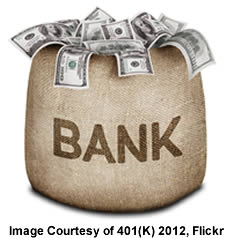 Since I personally have no clue about my finances or banking, I asked our President and founder, David Crary, about how he chose a bank. This seems like a big part of starting or maintaining any field service business, yet you don’t often hear tips on how to pick your bank. Being a business owner for the past 30 years, I figured he would have some good information. As it turns out, he was recently featured on HVACChannel.tv’s program “When to go to the Bank," with Ruth King, from turnonmyfinanciallightbulb.com.
Since I personally have no clue about my finances or banking, I asked our President and founder, David Crary, about how he chose a bank. This seems like a big part of starting or maintaining any field service business, yet you don’t often hear tips on how to pick your bank. Being a business owner for the past 30 years, I figured he would have some good information. As it turns out, he was recently featured on HVACChannel.tv’s program “When to go to the Bank," with Ruth King, from turnonmyfinanciallightbulb.com.
Crary and King sit down each month to discuss small business growth strategies, and this month was no different. The first and main thing you need to decide when banking is which bank is right for you. Banks, just like people, come in all shapes and sizes. So do companies. Below, I will lay out the key tips Crary and King provided when choosing a bank for your small business.
Size. Size is a big thing to consider. You may automatically head out to your nearest Wells Fargo or U.S.Bank just because they are the most well-known. But hold on a second. Bigger isn’t always better, and it’s especially true in the case of banking. If you are as big as let’s say Donald Trump, then yes, go ahead and choose a large bank. Big banks will loan you the money you want. The issue you as a small business owner may find with larger banks is that they will see of you as just a number. Now this is not true of all, but it is for some.
Do you really want to ask for loans from someone you don’t or can’t build a relationship with? You don't want to feel like just another number when discussing your finances. If you are a small business, think smaller. Smaller banks have fewer guidelines you will need to fit in to. This is a huge benefit for your small business growth. Big banks don’t offer any grey area. You need those grey areas. “My business has gone through recessions and cycles where we have been up and down. You want a banker that is prepared to handle and work through the grey areas with you”, says Crary. This leads us to our next point.
Have a relationship with your banker. Crary suggests it be someone in your community, such as someone on your chamber or someone who goes to your church. Someone involved in the community is best. You know they care about the businesses and people in your area and will work harder for you. They will probably own 3 or 4 local franchises in the area, so it’s better than a conglomerate bank where they can’t remember your name.
King also suggests investing some of your personal accounts into the bank as well. It shows you trust the bank as much as they trust you. This isn’t something you have to do, but it’s not a bad business practice if you want to show your appreciation back to the bank.
Bonus Tip. King talks about a contractor she read about who only dealt with one bank. He had all of his accounts in this one spot. The bank was bought out by a big bank, and they decided they were not going to support contractors anymore. This man and his company were for lack of a better word screwed. Using separate banks is a good way to keep all of your eggs out of one basket. You never know what can happen and it is better to be safe than sorry.







